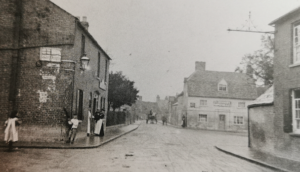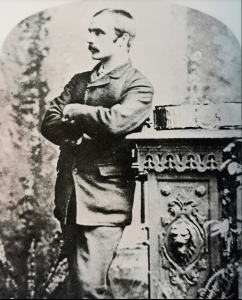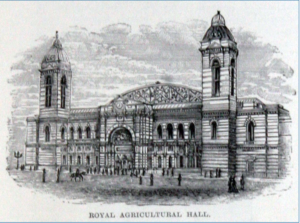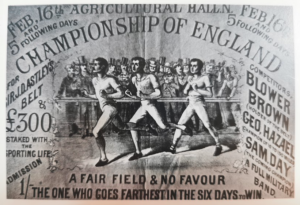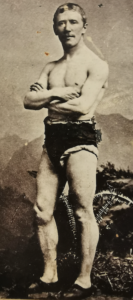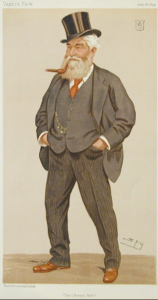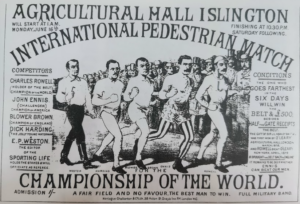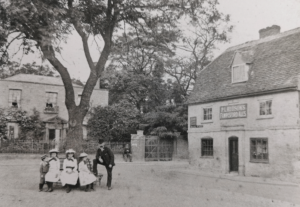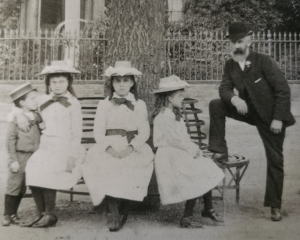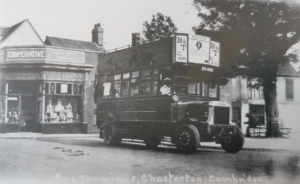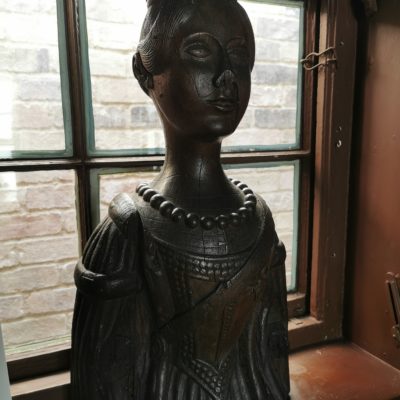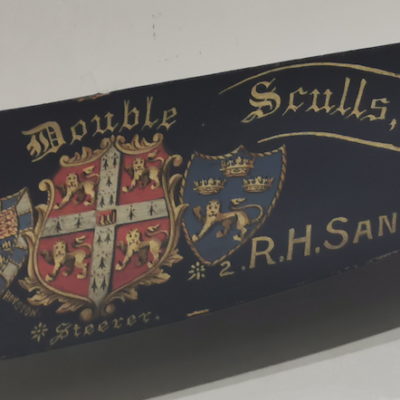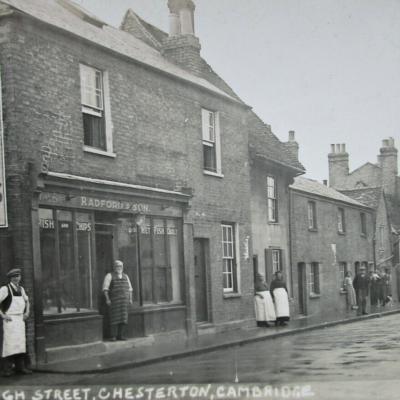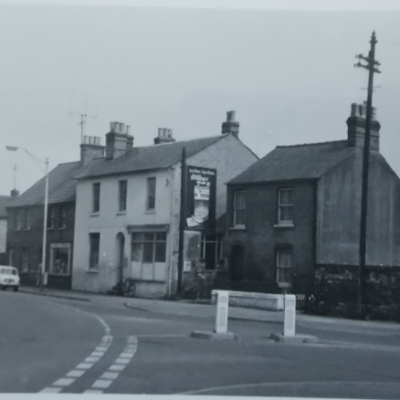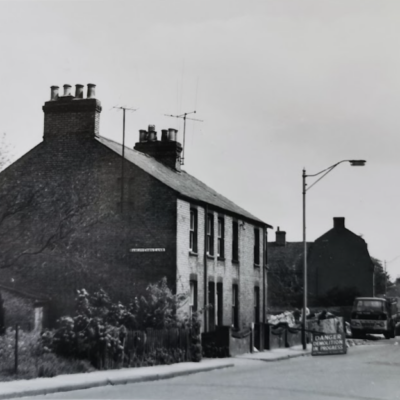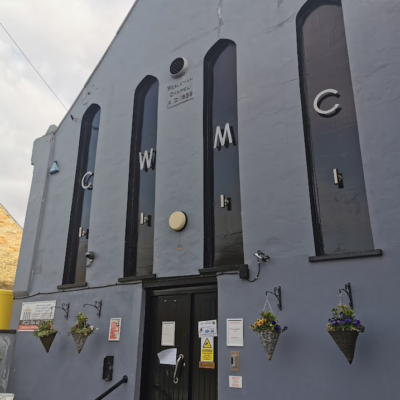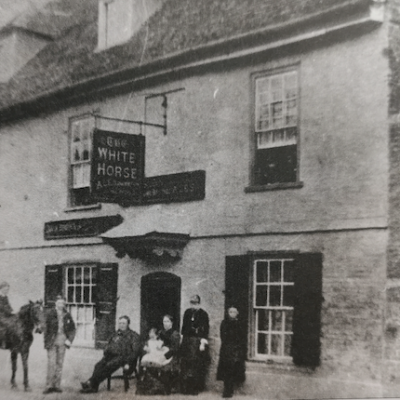Search by topic
- archaeology
- Building of Local Interest
- charity
- church
- crime
- dressmaker
- fire
- Great Eastern Railway
- Listed building
- Mapping Relief
- medieval
- oral history
- poverty
- Public House
- Rattee & Kett
- Religious House
- Roman
- scholar
- school
- Then and Now
- tudor
- women
- work
- world war one
- world war two
Search by text
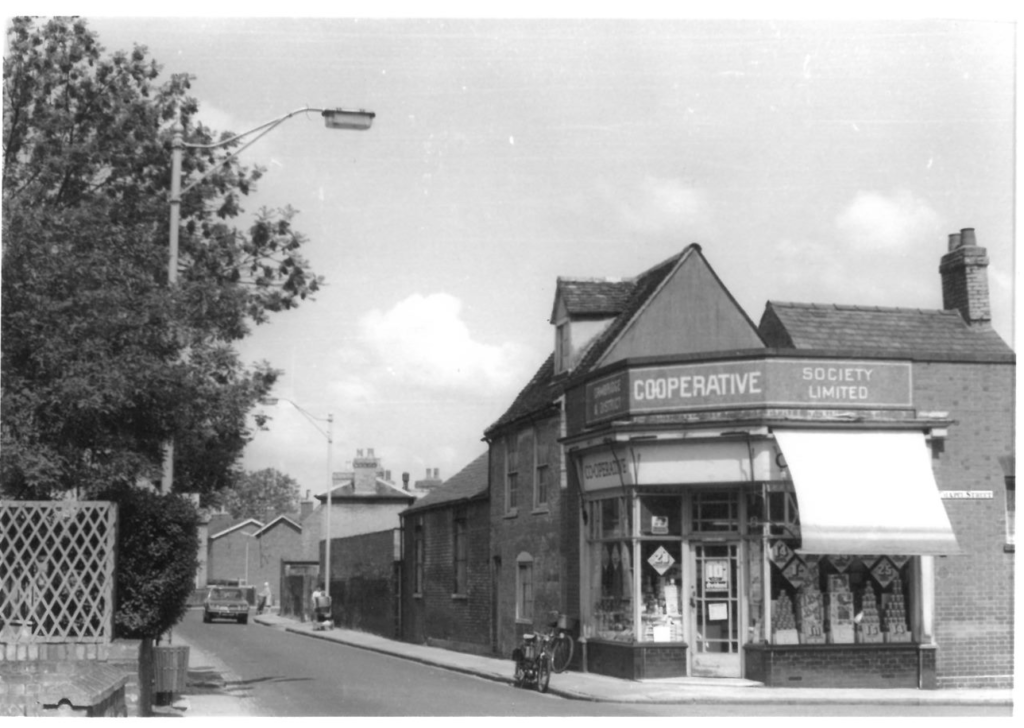 56 High Street Chesterton junction with Chapel Street c1969 (MoC 13/160/69)
56 High Street Chesterton junction with Chapel Street c1969 (MoC 13/160/69)56 High Street (Back Street) Chesterton, The Bleeding Heart, The Maltster’s Arms
History of 56 High Street Chesterton
The public house may have dated back to at least 1786. It was known as the Maltster’s Arms possibly becoming the Maltsters Arms (a large malthouse and kiln stood behind the pub, in the area now named Maltsters Way) and then the Bleeding Heart by the late 1800s, before being converted into a Co-operative store by the 1920s, demolished in the 1970s. The Wheatsheaf has also been demolished and replaced by modern housing.
(see https://pintsandpubs.wordpress.com/2013/04/28/haymakers-chesterton-cambridge/)
1861 no name, Back Street
Michael Rowell, 54, publican and shoemaker, b Chesterton
Sarah, 54, b Devon
Susan, 19, b Chesterton
Rebecca, 17, b Chesterton
Michael, 15, app. shoemaker, b Chesterton
Martha, 13, b Chesterton
Emma, 10, b Chesterton
Charles, 8, b Chesterton
Charles Rowell started work at boatyards in Cambridge. He would help University and Varsity crews and during this time became a competent rower himself.
1868 Michael Rowell dies
1871 Bleeding Heart, High Street
Michael Rowell, 25, publican and butcher
Caroline, 25, wife, b London
George Edward, 5, b Chesterton
Minnie, 3, b Chesterton
Maud, 1, b Chesterton
Sarah, mother, 65
Charles, brother, 15, labourer
Harriett Fordham, niece, 11, b Chesterton
In 1871-2 Charles was working at the Guards Club in Middlesex but he was also taking part in rowing regattas.
1872
20.1.1872: (North Wilts Herald:) On Monday, at Cambridge, a pair-oared race between John Sadler and William Asplen, and Charles Asplen and Charles Rowell was won by the former.
In September 1872 he won a sculling event at Maidenhead.
1873
29.11.1873: (The Sportsman) Charles Rowell of Cambridge is mentioned in a rowing article.
1874
22.8.1874: (Norwich Mercury) Sculling Match. A race of some interest took place over the new University course Friday evening, for a £10 cup and the honour of the amateur championship of the Cam. The competitors were—John Logan, boatbuilder (of the firm of Logan and Son), who won his spurs at the Ely Regatta in 1873, and who is well known in aquatic circles, and Charles Rowell, stiff built sculler, a trifle older than opponent, engaged for the most part at Maidenhead, but well known to frequenters of Searle’s. Rowell having recently beaten young Tom Clasper on the Isis, challenged Logan, who is as finely-built oarsman as one could wish to see. The pair met at six o’clock yesterday and rowed a time race, Rowell taking first section. There was scarcely a pin to choose between them at the Willows in Long Reach, and at the Railway Bride Logan seemed well in it; but from this point his opponent made the most progress, and at length Rowell was declared the victor by four seconds.
7.12.1874: (Globe) Running MATCH AT CAMBRIDGE, To-day a quarter of a mile race, for £10 a side, took place on Milton-road, Cambridge, between Richard Hutchins, Norwich champion, and Charles Rowell, of Chesterton, boatman at Messrs. Searles. Both runners obtained a good start, but Hutchins soon showed in front. When over a hundred yards from home Rowell gave up, being twenty yards behind, and Hutchins ran in alone in 55.5 sec.
1875
10.7.1875: (Penny Illustrated Paper) LONG-DISTANCE RACE FOR £50. One of the most important long-distance races that has been decided for considerable time took place at Lillie-bridge ground, on Saturday, between Charles Rowell, of Cambridge, and W. Shrubsole, of Bedford (late of Croydon). They met to run nineteen miles for a stake of £25 a side, and Rowell won with ease, doing the nineteen miles in 1 hour 57 min. 45 2-5th sec., according to the timing of Mr. Jenn.
1876
24.2.1876: (York Herald) PEDESTRIANISM. ANOTHER MATCH AGAINST TIME. At five minutes past eight on Tuesday night, Edward Payson Weston, the famous American pedestrian, commenced his attempt to walk 275 miles in 75 consecutive hours, and, from his previous performance, there can be no doubt that he will be waking with little cessation until five minutes past eleven on Friday night. The match is not against time alone, as, after defeating Perkins and Clark, he has found a fresh victim In Charles Rowell, a well-known Cambridge waterman. The latter is allowed to walk or ran as he pleases — in professional language to “make the best of his way” — and as he is a very muscular and powerfully-built man, and has frequently distinguished himself over long courses, he is likely at any rate to make some semblance of a struggle. The Agricultural Hall, Islington, is again the scene of the match, and as before, each man has his own track, Weston walking in the inner circle. He was dressed in his usual velvet coat and breeches, leather gaiters, white kid gloves, etc., while Rowell came out In a jersey and long flannel drawers, with short ones over, and, from the thinness of his shoes, it was apparent that he intended to begin by running. This proved to be the case, and his first mile was covered in 7min. 45 sec., while Weston, who, as usual, began slowly, with 12min. 9sec. in getting over the same distance. The American, however, sooned warmed to his work, and each of the next few miles was more than a minute faster than the first, the ten being covered in 1h. 51min. 5sec. Rowell. who ploughed along very steadily, occupied 1hr. 20min. 31sec. in getting over the same distance. Just after completing twenty mile., Rowel stopped for 16mins 45sec., and, when he reappeared, had changed his running shoes for very thick boots, and commenced a spell of walking. He moved in very fair form, though not quite so fast as his opponent, and at 11.45p.m., or 3hr 40min from the start, had covered 23 mile 4 laps, against Weston’s 19 miles 2 laps. Up to this period the latter had not rested at all, and was going remarkably well. The first stoppage of any note was made by Rowell yesterday morning, at at 2hr 54mins 31sec, and alter resting 3hr 19mins 54sec. he resumed his task at 6h. 14min. 25sec. Weston had not left the path. At ten o’clock Weston had covered 68 miles, 3 laps and a half. Rowell retired after going 58 miles 10 laps. Rowell’s last mile was 11min 34sec during which he ran and walked — in fact, since his rest he has adopted similar tactics. Weston’s mile occupied 13min. 4sec. Rowell reappeared in eight minutes, and at once commenced running, looking in excellent spirits and going in good form. Weston’s sixty-ninth mile was registered as 12min. 10sec. Howell’s sixtieth mile was registered at 16min. 57sec, including the stoppage. Weston partakes of no solid food, but Rowell had slept well during his long rest, and, on rising partook of a chop. His 61st mile was covered in 8min. 48sec. and Weston’s 70th in 12min. 50sec. Rowell traversed his 62nd mile in 8mins. 14sec., and Weston his 71st in 12mins 40sec. A noticeable feature was the improvement made in the paths, which, when the men commenced last evening were in anything but a good condition, particularly Rowell’s. The last-named covered his 63rd mile in 13mins 42sec having walked a considerable portion of it. At 16 minutes to 11 Rowell relinquished hostilities having completed 63 miles 3 laps. Weston covered his 72nd mile in 12m 35sec. Weston completed his 73rd mile in 12min 46sec. He retains his original jocular style of expression, and, when he appears most fatigued, suddenly brightens up and removes any serious apprehensions entertained by those who are unacquainted with his peculiar style of procedure. The 74th mile took him 13min. 15secs. but he improved in pace during the next, and completed it i12min. 42sec. The succeeding mile showed but a slight diminution of speed, it taking the pedestrian but 2sec. longer than the previous one. The 77th mile was completed in 12min 50secs. It is worthy of mention that Weston has discarded to a great extent so many of the drinks he took when he first appeared at the Hall a fortnight ago. He now takes principally calf’s foot jelly, essence of beef, and oatmeal gruel. At 1.30 Rowell reappeared in good form and started at a brisk trot. At this time the score stood : — Weston, 81 ; Howell i63 miles. At 2.40 Weston having completed 90 mile, took his first rest. Rowell had left the course just previously, having made 72 miles. At a quarter-past five Weston having completed 100 miles retired to rest. At 7 o’clock Rowell had completed 90 miles. Weston (the American) re-appeared at a quarter-past 7, looking refreshed. At 18 minutes past 9 Rowell had completed 100 miles. He then left the course enthusiastically cheered by the spectators who were present in great numbers; at the same time Weston completed 110 miles.
4.3.1876: (Athletic News) SATURDAY, MARCH 1, 1876 BEHIND THE SCENES. Certain revelations have been made respecting Weston’s recent performances in the Agricultural Hall which will assuredly not operate favourably upon the public mind with regard to this species of sport. About the American’s extraordinary prowess as pedestrian there cannot be two opinions, and though some of our contemporaries have expressed their contemptuous impatience of his eccentricities—as, for instance, his cornet playing and peculiarities of costume—-the idea of pedestrian wearing white kid gloves !—we do not see any necessity for being severe upon our visitor with regard to these little matters. he fancies himself as a musician, there is not the slightest reason why his crow of triumph should not take the form of trumpet solo; and it is, at all events, creditable to his good taste that he selected Cod save the Queen” as the tune wherewith to give the public a taste of his quality. The kid gloves certainly savour of affectation, but our American cousins have for a long time been tacitly allowed considerable latitude in the airing of their whims and notions. The term Yankee has gradually become synonymous with everything that is odd and outre, and so long as its tendency is harmless, we do not see why this national characteristic should not have its fling. Assuredly the crowds who listened to the dulcet strains of Mr. Weston’s comet at the Agricultural Hall were in no way offended by the display of the American’s musical accomplishments. the contrary, they seemed to regard it rather as a good joke, and cheered the performer accordingly. The same may be said of his odd behaviour whilst walking. It tickled the stolid Briton’s not over-lively sense of humour, and so far may be said to have answered a useful purpose, since moralists tell us that laughter is good for us. Therefore, we are perfectly willing for our part to condone all Mr. Weston’s offences against our insular notions of propriety. We regret to find however, that the American clipper has laid himself open to charges from which he cannot be easily exonerated. THE ATHLETIC NEWS. In the eyes of all true lovers of sport Mr. Weston’s performances are noteworthy by reason of the extraordinary proofs of physical endurance which they afford, and will be admired for their own sake, without regard to apparent competitions they have evoked. To the public, however, the sight of a solitary wanderer truging along a track in a vast hall for an extraordinary number of hours would not have been particularly exhilarating, even though the party question did seek to vary the monotony by cracking whip, carrying bouquet, and so forth. Consequently, to attract large gate it was necessary that some one should be found to oppose him for the honour of Old England. Perkins, as the champion English walker, undertook to oppose him, and it is only reasonable to suppose that the match was genuine. The plucky Briton persevered even when the struggle was seen to be hopeless, and the condition that he was in when he at last succumbed to overpowering fatigue and exhaustion gives colour to this assumption. In his next journey Weston was opposed by Clark, of Hackney, who had been credited with doing fifty miles in 9h. 24min. 16secs. —the “fastest on record.” How ignominiously the latter acquitted himself is well known. He gave up after going miles, in which he by no means approached his previous performance, and retired quite fresh and undistressed. This did not look much like a genuine encounter ; but worse remains behind. Weston’s third and, up to our time of writing, latest journey occupied seventy-five hours, in which he undertook to walk 275 miles. It was clear that after the easy defeats of Perkins and Clark this country could not produce a man of sufficient calibre to encounter him with the remotest prospect of success. Yet, unless a competitor could be found, the walk was likely to be very unproductive so far as gate money was concerned. Some one must be found at all hazards, and accordingly it was announced that Charles Rowell, of Cambridge, who was represented to be perfect wonder on the running path or in a boat, would make the best of his way, either running or walking against Weston, being matched against the latter by “Mr. Nichols, of Canterbury.” It was also stated that Rowell, in the event of his walking all the distance, would receive fifty miles start, but this condition was announced, so far as we are aware, in only one journal, and the public generally was undoubtedly under the impression that the men were to start level. It is now plainly stated that Rowell, instead of being matched, was hired to accompany Weston for money payment, and as he both ran and walked from the commencement, his fifty miles start was of course forfeited from the first. What then was everybody’s surprise when, shortly after -I p.m. on Thursday week, and when Rowell had fallen long way in the rear, to see a bill stuck up on the marking board with the inscription, “Miles allowed, 50.” Bulletins were then posted up at the entrances to the hall announcing that the men were nearly level, and no doubt many people were induced by these representations to visit the hall in expectation of witnessing a good race. This was not treating the public honestly, and either Mr. Weston, or those who acted for him, must have been perfectly aware of it. In America no doubt this would have been looked upon a “smart thing,” but in this obfusticated old country we are in the habit of calling such practices by a harder name. This was done, too, in spite of the remonstrances of the judges, who it will be remembered consisted of the representatives of the metropolitan sporting press. “Land and Water,” in commenting upon the affair, facetiously remarks, “There’s another good man gone wrong” and it is, indeed, a matter for regret that Weston, who cannot be described as professional pedestrian, and who is evidently a man of superior attainments, should have done anything to forfeit the good opinion which his previous straightforwardness had earned for him. Admiration of his extraordinary athletic powers we cannot but continue to feel, but he must not blame the Press or the Public if his next essay proves to be far less remunerative than his previous journeys have been.
1877
24.3.1877: (Cambridge Independent Press) Report on the case of Thomas Keith charged with stealing £2 11s 10d from Caius Boathouse, Cambridge. Charles Rowell found an empty purse at the Jolly Waterman.
7.4.1877: (Cambridge Independent Press) 1 Mile race won by J Simpson with C Rowell 3rd.
J G Simpson has been described as C Rowell’s trainer.
25.9.1877: Rowell’s crew beaten by Asplin’s crew in the final of the Waterman’s Four Oared Race at the Maidenhead Local Regatta
1878
22.8.1878: Rowell’s crew win final of Waterman’s Four Oared race at Maidenhead
12.10.1878: (Manchester Evening News) The following are the twenty selected candidates for the six days’ international pedestrian competition, commencing at the Agricultural Hall on October 28th, for which Sir John Astley, Bart., guarantees over £750 in prizes .—William Barnett, Leeds “Blower” Brown, Fulham ; William Corkev, Bethnal Green ; Arthur Courtney, Barnet; William Croft, Hull; Peter Crossland, Sheffield : John Ennis, Chicago, America; John Hibbert, Bethnal Green : John Higgins, Hornsey; E. C. Holske, New York; John Jackson Holmes, Nottingham; William Howes, London ; John Hughes, Newark, America; George Ide, Woolwich; Walter Lewis, Islington ; George Parry, Manchester ;G. Pellett, Sittingbourne; Charles Rowell, Cambridge; Harry Vaughan, Chester ; Edward Payson Weston, Providence, America. Substitutes: W. Green, W. Gregory, Owen Hancock, Joseph Hayward, and Alfred Thatcher, all of London.
For Sir John Astley’s autobiography.
28.10.1878: Rowell competed in Long Distance Championship of England – 6 day walk. Came third completing 470 miles and 1 lap but was 12 hours off the track. Won £50 prize.
9.11.1878: (Brecon County Times) GREAT PEDESTRIAN CONTEST. A six days’ pedestrian contest, in which twenty three competitors took part, has come off at the Agricultural Hall, Islington. Sir John Astley, M.P., had warranted prizes to the amount of 1.750, the winner taking £300 and a challenge belt valued at £100, the latter becoming his personal property when he shall have won it in three consecutive matched, such matches to take place in London. A capital track of exactly seven laps to the mile had been laid down for the occasion, and all the men used the same path. As was the ease in March, the men were not confined to walking, but might make the best of their way on foot. O’Leary, the winner of the fir t belt given under the same conditions as the present. was unfortunately absent, but his place was supplied by three of his countrymen—Newton, Ennis, an i Richardson. The names of the other men who too : part in the race were follows Barnet:, of Leeds : H. Brown (“Blower”) Fulham; W Clarkson Hull; W. Corkey, Bethnal-green ; Arthur Courtney, Barnet; W. Croft, Hull; Peter Crossland, Sheffield; S. Day, Northampton ; Owen Handcock, Shadwell ; Josh Hayward, Billingsgate ; John Hibbert, Bethnal Green, John Higgins, Hornsey ; John J. Holmes, Nottingham ; William Howes, City ; George Ide , Woolwich; O. Pellett, Sittingbourne ; Charles Rowell, Cambridge ; A. Thatcher, Canning Town ; Harry Vaughan, Chester; and W. Smythe, Dublin. The start was made shortly after midnight, Weston went off even more slowly than usual ; but nearly all the other begun at a slow run, Vaughan being the first to shew with a slight lead, he was soon overtaken by Brown. During the first day nothing of much importance transpired, except that Thatcher was unfortunately taken ill, and compelled to be absent from the track for a good many hours ; while Weston took far longer rests than he has generally done, and allowed three of the men to get well away from him. At eleven o’clock the same night, or twenty-two hours from the start, the order was as follows :—Vaughan and Brown (both resting), 110 miles ; Crossland (walking), 108 miles ; Corkey (running), 103 miles; Rowell and Barnett (both resting), 100 miles; Weston(walking), 96 miles ; Hancock and Croft (both walking), 93 miles; Howes (resting), 91 miles ; Ennis and Pellett (resting), 90 miles ; Hibbert, Courtney, and Higgins (resting), 88 miles ; Richardson (resting), 84 miles ; Ide (resting), 82 miles. The others were some distance behind, Thatcher and Smythe being last. At three o’clock in the afternoon of the second day Corkey, who was then in front, had succeeded in beating Vaughan’s record for 170 miles, walked by him in May last, on which occasion he covered the distance in one day 13 hours 42 minutes 53 seconds. Corkey accomplished the same distance in one day 13 hours 0 minutes 53 seconds, Crossland at the time being only three laps behind Corkey. The position of the leaders at eleven o’clock on the second night were—Corkey, 201 miles 4 laps ; Brown, 200 miles(resting); Crossland, 200 miles (resting ) ; Vaughan, 193 miles 2 laps; Weston, 176 miles 3 laps ; Hibbert, 170 miles 3 laps ; Croft, 169 miles 6 laps ; Rowell, 169 miles 5 laps ; Howes, 169 miles ; Ennis, 162 miles 4 laps. At four o’clock the next morning, Vaughan after having covered 200 miles 6 laps was obliged to leave the track, one of hie ankles having given way from the effects of an old sprain. The chief interest of the match now centred in the wonderful struggle between “Blower” Brown and Corkey, who hour after hour continued to pass and repass one another. By eleven o’clock on the third evening the leading men had made the following scores :—Corkey, 283 miles 5 laps ; Brown, 281 miles laps ; Crossland, 266 miles ; Weston, 257 miles 6 laps : Rowell, 255 miles ; and Hibbert, 253 miles 2 laps. No one was within fourteen miles of Hibbert, though two or three of the other men were going very well, notably Croft, Courtney, Higgins, and Ennis. All through the following day the struggle between Corkey and Brown was kept up with unflinching determination. Each seemed afraid to leave such an opponent in possession of the track. A run from one was answered by a double from the other, and they were seldom more than a few yards apart. When the clock struck eleven, the sore of the leading men stood follows :—Corkey, 370 miles 6 laps ; “Blower” Brown, 368 miles ; Weston, 337 miles ; Hibbert, 329 ; Rowell, 317 miles laps ; Crosland, 308 miles 3 laps. None of the others had then accomplished 300 miles, though Courtney, Howes, Ennis, Richardson, Day, and Croft were all doing very well. One of the finest performances of the week was accomplished by Rowell on the following morning. He then occupied the fourth position, Hibbert being third and Weston fifth. A little before ten o’clock he began to run, and covered twenty-five miles without stopping, he then walked a couple of laps, and then starting again ran eleven miles more. This extraordinary effort took him into third place. Shortly after five in the afternoon Weston, who had made a score of 365 miles, retired, and was visited by the medical attendant. He was suffering from a sprained tendon in his left foot, and was consequently ordered not to continue any longer with a view to make time. The position of the men at eleven o’clock on the fifth night was :—Corkey, 457 miles ; Brown (resting), 450 miles ; Rowell, 400 miles ; Hibbert, 387 miles ; Weston {resting) 365 miles one lap ; Ennis (resting), 360 miles ; and Courtney (resting), 360. At seven o’clock on the evening of the last day Corkey completed 520 miles, and a few minutes later, with two extra laps had beaten O’Leary’s time for a similar distance by 1h 5m 49s. At 8.20 the men retired by mutual consent, the final record standing as follows :—Corkey, 521 miles ; Brown, 506 miles 1 lap; Rowell,470 miles : Hibbert, 440 miles ; Ennis, 410 miles 6 laps; Courtenay, 405 miles ; Day, 40 0 miles 1 lap ; Richardson, 380 miles; Howes, 370miles 6 lap; Croft, 370 miles ; Weston, 365 mlles 1 lap; Clarkson, 357 miles ; Ide, 355 miles 5 laps ; Pellett, 340 miles ; Crosland, 335 miles ; Handcock, 324 miles 6 laps; Higgins, 302 miles ; Barnett, 256 miles 4 laps ; and Smythe, 223 miles 3 laps. Corkey, who has thus won the position of long distance champion of England, is a small man, standing only 5 feet 4 inches in height, and weighing about eight stone.
End of 1878: Rowell is trialled by Astley at Elsham Hall. Astley supports Rowell with £250 to go to New York.
1879
18.1.1879: Rowell walked with E P Weston at the start of Weston’s six week walking tour of England
28.2.1879: Travelled to USA on line ‘Parthia’
3.3.1879: George Atkinson, representative of Sir John Astley, arrives in New York
10.3.1879: 3rd Astley Belt competition at Gilmore Gardens. Rowell wins covering 500 miles.
13.3.1879: Boston Globe describes Rowell as ‘coach’ for English University crews
19.3.1879: (Eastbourne Gazette) THE LONG DISTANCE PEDESTRIAN CHAMPIONSHIP. The six days’ contest for the Long-distance Pedestrian Championship of the World was finished on Saturday evening, at ten o’clock, at Gilmore’s Gardens, New York, in the presence of an immense assemblage. Charles Rowell, of Cambridge, England, proved victorious, having travelled 500 miles ; John Ennis, of Chicago, was second, having covered 475 miles ; and Charles A. Harriman, Boston, third, having placed 450 miles to his credit. Daniel O’Leary, the late champion, retired on Wednesday afternoon, having travelled 215.25 miles.
19.4.1879: Cambridge Independent Press reports Rowell’s return from USA. His prize money is reported to be about $19,000.
12.5.1879: Welcome home ceremony at Bleeding Heart pub.
21.6.1879: (English Lakes Visitor) SIX DAYS’ WALKING MATCH, Once more the Agricultural Hall is the scene of a trial of endurance, this time for the “long-distance championship of the world” belt and a sweepstake amounting to £500, together with a large percentage of the gate receipts. When the belt was originally presented for competition, Daniel O’Leary, of Chicago, won it, beating Vaughan and eighteen others, and thus the belt was taken to the United States. Here O’Leary was challenged by another American named Hughes, who had to put up with en easy defeat. Then Charles Rowell, of Cambridge, was deputed by the mother country to meet the redoubtable Yankee; and, accordingly, in the early part of the spring Rowell defeated O’Leary, Ennis, and Harriman in New York, and brought back the coveted trophy. Ennis. of Chicago, U.S.A., challenged him immediately, hence the present contest. On the match being ratified, “Blower” Brown, of Fulham, the English champion (holder of the second Astley belt) ; R. Harding, of Blackwell (hitherto better known in connection with sculling than pedestrianism); and B. P. Weston, of Providence, U.S.A., joined issue, and deposited their several “hundreds” to make a sweepstake. Up to last week everything went well, as Rowell was considered to have a great chance ; but while training he ran a nail into his heel, and consequently he was compelled to resign the belt to be competed for by the others. The start took place in the presence of a large number of people.
22.9.1879: 5th Astley Belt Race in Madison Square. Rowell wins covering 524 miles 7yds
6.10.1879: legal action in New York over ownership of Astley Belt. Awarded to Rowell.
5.11.1879: (The Sportsman) Return of Charles Rowell to Cambridge. Yesterday Charles Rowell returned to Cambridge from Maidenhead, whither he had journeyed on landing in England on Sunday. There was no demonstration at Rowell’s express wish. The family have recently suffered sudden bereavement. Rowell looks wonderfully well.
1880
14.8.1880: (Sporting Life) Charles Rowell to Curtis, Spirit of the Times, New York, ‘’Agricultural Hall, London, not obtainable for any match this year but second week in September. That will suit me; or will give you longer time, and walk provinces.” Up to hour of going to press no reply has been received. It will be recollected Mr Curtis suggested the middle of October a suitable time for the match, and this would have been favourable if a suitable building could have been engaged in the metropolis. The Agricultural Hall, however, will not available for pedestrian match before second week February 1881, being let up to that time for forthcoming shows. Rowell appeared highly pleased the prospect of having an opponent, and he looks in splendid fettle. He tramped up from Cambridge (about fifty two miles) on Thursday, just to stretch his legs a bit and afterwards journeyed to Putney pay Trickett and Laycock a visit, returning back to Cambridge by rail same evening for his sung little training quarters in Chesterton.
1.11.1880: (Morning Post) Pedestrian Contest.— The fifth great international pedestrian contest for the handsome challenge belt presented by Sir J. D. Astley, with which is to be associated the long distance championship of the world, has commenced at the Agricultural Hall, Islington. The belt was first won by Daniel O’Leary with a record of 520.25 miles, and by him it was taken to America. Charles Rowell went thither and brought it back; the full distance he accomplished in six days on that occasion being 530 miles 180 yards. The indomitable E. P. Weston next became its possessor, with the marvellous record of 550 miles. Once more the belt went to America, and once more Charles Rowell, who was unable to start in the third contest, crossed the Atlantic and brought it back, his last record being 530 miles. For the contest which commenced at one o’clock this morning there are six competitors, three being Englishmen, whilst three hail from America, so the present race is more than usually of an international kind. Their names are Charles Rowell, of Chesterton, Cambridgeshire, holder of the belt ; William Pegram, a man of colour, of Boston, Mass., USA to whose name stands a record of 543 miles in six days in America; Harry Howard, of Montclair, N.I. USA, who has scored 534 miles in a similar contest; John Dobler, of Chicago, an American pedestrian possessing great powers of endurance; “Blower” Brown of Fulham, holder of the championship of England belt, whose greatest achievement is 553 miles 165 yard in six days ; and G. Littlewood, of Attercliffe, Sheffield, who has won several long distance contests in England. All the men are in capital condition, and an exciting contest may be expected. As usual, the men travel as they please, either running or walking. The stakes amount to £600, which the winner will take, together with half the admission money, the rest of which will be proportionately divided amongst the others subject to certain distances being accomplished.
13.11.1880: (Tamworth Herald) The Six Days’ International Pedestrian Championship Contest was decided on Saturday evening, and Charles Rowell succeeded retaining the Astley Belt, which gives to its possessor the title of Long distance Champion of the World. The final distances were: Rowell, 566 miles and 7/8 of a lap; Littlewood, 470 miles 3 laps ; Dobier, 450 miles 3 laps Howard, 240 miles 1 lap ; Pegram. 88 miles; and Brown, 73 miles 5 laps.
1881 Bleeding Heart
Michael Rowell, 34, butcher publican farmer 66 acres emploing 5 men and 1 boy, b Chesterton
Caroline, 34, b Chesterton
Minnie, 3, b Chesterton
Michael, 9, b Chesterton
Charlie, 7, b Chesterton
William, 3, b Chesterton
Henry, 2 mos, b Chesterton
Annie Barnsley, 21, servant, b Chesterton
In 1891 the Rowells are living and working at Scales Hotel (Portland Arms)
11.2.1881: Rowell travels to New York
28.6.1881: (Lincolnshire Free Press) The six days’ and nights’ go-as-you-please match between the champion, Charles Rowell, and the ex-champion, Edward Payson Weston, for £200, the Astley belt, and the long-distance championship of the world, at the Marble Rink, Clapham road, was brought to an abrupt conclusion on Wednesday afternoon, about half-past four, when Weston retired from the contest owing to illness. Rowell has now won the belt three times, and becomes its absolute possessor.
1882
17.5.1882: (Sporting Life) ROWELL’S RETURN TO ENGLAND. The New York Sun of May 3 has the following: “If Charles Rowell had just achieved a great pedestrian victory could not have received more hearty cheers and lusty “Goodbyes!” and shouts of “Good luck!” than greeted him when he stood on the bow of the Wyoming yesterday afternoon as she backed out into the stream preparatory turning her nose toward the shores of Old England. Among the crowd on the pier were his backer, Mr. Peter Duryea, and a cluster of sporting men, actors from Wallack’s Theatre, and many friends whom the little Englishman has made during his long stay in New York. He takes three fine trotters over with him in the Wyoming. One is the stallion American Boy, with a record of 2.17; another the mare Maud D., by Almont, dam a Virginia-bred mare, and the last a two-year-old colt by Auctioneer, dam by Lexington. Rowell also took two light road wagons, a sulky, and two sets of trotting harness. One of the trotters belongs Mr. Duryea who will follow Rowell in about a month. The horses are to trot in Alexandra Park and other places where trotting is becoming fashionable in Europe. Last year a trotter taken over Mr Duryea performed so well that brought 10,000 dollars in France.”
As our readers are aware, Rowell arrived in the Mersey on Saturday last, and made direct for his brother’s house at Chesterton Cambridge, where had a cordial greeting from all his old friends and acquaintances.
9.6.1882: (Derry Journal) TOO MUCH OF A WALK. Pull up your pants, papa.” Aristides M‘Guire heard these words as they came from the ruby-red lips of Gwendolen Mahaffy and floated to his ears on the softly sighing and sensuous breeze of a June evening. He looked, and saw the pretty feet and shapely ankles of Gwendolen as she picked her way carefully along the muddy crosswalk. noted the tenderly solicitous tones in which she addressed her father, and that tone thrilled his very blood. Weiss beer would also have done it, but Aristides was not so fly as he might have been. Scarcely knowing why he did so, the young man followed the girl and her father, until finally they turned up Ogden avenue, and, as Gwendolen headed southwest and stood for an instant with her polonaise fluttering in the wind, she turned to her companion and said : Ours is next to the last house the street, isn’t it, papa ?” Yes, my darling,” replied the old man. How long is this street ?” asked Aristides of policeman. Five miles.” The young man entered a neighbouring saloon and sat down with a dull thud. I love her madly,” he said, “ but, Heaven help me, I am not Charles Rowell. —Chicago Tribune.
3.9.1882: Rowell arrives in New York on the ‘Alaska’
23.10.1882: competes but falls ill
28.11.1882: (Toronto Daily Mail) Hanlan and his friends yesterday did the city pretty thoroughly, winding up in the evening at the Grand Opera house. In the afternoon after dinner at the Walker house, “Ned” with Mr. Duryea, Howell, and Lee, drove round town, paying visits on the way to Mayor McMurrich, to Ald. Boswell—the coming Mayor—and to a number of friends of the champion. Charles Howell, who, notwithstanding ill fortune in his recent ventures, is still regarded as the first of long distance pedestrians, has been described dozens of times, but little excuse need be made for further notice, now that he is actually at hand. He is quiet and reserved in meaner, below middle height, but well-proportioned and firmly built and much indeed of the same style of physique as Hanlan, although, of course, smaller. His weight now is close on 150 pounds. while Hanlon scales 183. Like Hanlan, be good looking in face, and of the same cast of feature. but much darker, and with a squareness of jaw indicating the determination necessary to take a man to the front in such contests its six days races. Howell is looking in excellent health, and from snatches of conversation with him during the day it is evident that he has not the slightest intention of retiring from the track as yet. Neither he nor Mr Duryea, who has been backing him, think that his break-down in the recent race in Madison Square garden was due to anything save temporary causes. Howell was unwell for ten days before the start” said Mr. Duryea, although nothing was said about it, and I wished him not to start. He was anxious to do so however and thought he could carry it through.”
“Then it was not fear of heart which stopped him?”
“No. It was malaria, which, of course told on his whole system, but which had hold of him before the race.”
Rowell subsequently said the same thing, in response to a question as to whether such work as six-day races had not as injurious effect physically, said he did not think it bad. “I believe a man can under take one or two six day races a year with perfect safety” and he, “and with with benefit to himself, if he is properly prepared. The exercise does him good.”
“And does he not feel the effects later?”
“Not a bit. Do I look as if such work had a bad effect? I have gained fifteen pounds since the last race.” Rowell certainly looked a pretty healthy invalid. “I do not intend to retire yet by any means.”
Someone remarked that it seemed to be pretty hard work to get good men to quit at all, as Hanlan himself had promised to do so two or three times.
“So I have heard,” said Rowell, “and perhaps the safest thing I can do is to promise to retire when Hanlan does.”
Hanlan smiled and said he had some work to do yet.
“I am going to take a year’s rest,” said Rowell quietly, “and then I hope to be champion again.”
In training Rowell does not adopt any rigorous system of diet, taking three plain meals day of much the same food as a rowing man would train on. The notable part of his training programme is in the amount of exercise he takes. Occasionally he goes a hundred miles inside of twenty-four hours, while during the last month or so of his training be likes to average sixty or sixty-five miles per day. This work he believes to be none too much. “If I could not take plenty of exercise I should die” he remarked half seriously.
The famous pedestrian was taken by the appearance of the city during the afternoon’s drive, remarking repeatedly that it was one of the prettiest places he had seen. He thought the aspect of the houses on Jarvis, Wellesley, and Bloor streets similar to English better class dwellings, and indeed remarked during the afternoon that he experienced little difference between England and America, and could see none in the people between England and Canada. It is Rowell’s first visit to Canada, with the exception a flying trip made to Niagara some time ago.
Mr. Duryea, who has been Rowell’s backer for two or three years, and who is pretty deeply interested in sporting matters, and now the backer, friend, and adviser of Lee and Hanlan to boot, first took Rowell in hand after the latter’s second race on this continent, and has since been behind him as far has been necessary. His present visit to Englacd is in connection with Lee, who is anxious to row any number of Englishmen, one down t’other come on. There is not at present much prospect of matches, and there is probably no oarsman on the other side, bar Boyd, who would have the ghost of a show with Lee. Lee would probably have a much better chance of being accommodated in Australia, but Australia is not by any means next door to the Eastern States. Mr. Duryea and Lee will both return from England in April next year, at the latest, Mr. Duryea having to be back in America about that time to look after Hanlan, and Lee having to be back also if Hanlan and he find any couple adventurous enough to tackle the two of them in double sculling. Hanlan and Lee have not yet been together in a boat, but are confident that they will fit in tolerably well. “We are of about the same height and build” remarked Hanlan, speaking of the matter, “and will need only practice. Any two men of the same style of physique can get to pull satisfactorily together. A big man and a little one would never do, nor a long man and short one. You know it was proposed that Ross and myself should row doubles, but we would never do.” Lee rows within three or four pounds of Hanlan and has nearly the same weight at present as the champion.
Mr. Duryea has left two deposits of $500 each at the office of ‘Turf, Field, and Farm’, in New York, as forfeit for two races. He will match Edward Hanlan against any man in the world a single-scull race of three or five miles, to be rowed on water in the United States, for not less than $2,000 a side. He will also match Edward Harlan and George W. Lee. rowing double, against any other two men rowing double, a race of three or five miles, on water in the United States, for from $2,500 to $3,000 a side. Parties wishing to accept either or both of these challenges can do so at any time, and Hanlan will go to New York and sign articles of agreement.
Lee’s challenge to Courtney recently published has not yet been noticed by the Union Springs man. Lee is confident that he is a match for the other, or indeed for any man now rowing, bar Hanlan and perhaps also Ross. While talking with Hanlan and Lee about rowing matters, Kennedy’s name was mentioned, and the question was asked Hanlan why he thought so much of Kennedy’s powers.
[The next section is difficult to read in the OCR version on the BNA website]
He is a first class man,” said Ned, and I believe that he can beat any man in the States, except perhaps George here,” refering to Lee. ” Net he has dope nothing ?” ” Well, he is a good man, and has any aniount nerve. That is what I look at, said Haulau. Mal see why you think so,” remarked ho has beaten no one in particular. /Most of us think he is overrated. As Lot is pretty well posted as to the capabilities of smaller., his opinion oucht to be worth something. Still /lonian very rarely either underrates or overrates an opponent ‘peak.ng of Frank Holmes, ox-champion amat ar recently iiisqualitied by the sited Mate• Amateur Asauc.atinit Lee said that hail not seen him his disqualitittatoo, but supposed he would now row as • pro!asto•al, Lee was of opinion that It would sot be wise in him to do an, as there was no one he was likely to beat ex,ept perhaps GaiseL Ganwl’s re victory tn. r r,ihott . of Llyth, ex-champion of England, meaner Lee nor Ronal armed to think nun.; account, it being raid that Elliott completely off” on the day of the snow noexplained mann. bas beau poboustad
[the text is clearer from here]
by Hanlon with a handsome set of outriggers, rowlocks, and oars, and will try some rowing himself shortly. Hanlan, it seems, got Rowell out on the water in New York and downed him in great style, in exchange for the beating Rowell gave him on the track.
Hanlan has given up any ideas of going to Australia or anywhere else, and is taking up house in the city for the winter. Mr. Duryea, Rowell, and Lee, leave for New York this afternoon at 3.30, and will remain in New York until they sail for England by the Arizona, December 5.
1883
28.10.1883: arrives on Alaska with manager Duryea
6.11.1883: (Sporting Life) ROWELL CHALLENGED BY FITZGERALD. The following letter from Fitzgerald (winner of the last great six days’ go-as-you-please race in America) to Rowell appears in the Turf, Field, and Farm of October 26:— TO THE EDITOR THE TURF, FIELD, AND ARM.” Sir,—l see by the London Sporting Life of October 10, that Charles Rowell was to sail for New York on the Alaska, October 20. making the announcement the Sporting Life remarked, Rowell (who, by-the-bye, looks wonderfully well, and has been pronounced sound as a bell the Queen’s physician) will accompany Mr. Duryea, who open to make a match with Fitzgerald or any other man in the world for the long-distance go-as-you-please championship.” I have been ready to meet Charles Rowell ever since I defeated him one year ago and I am glad to learn that he is fit and well, and willing to again contest the Long-distance Championship of the World. I hand you with this 1,000 dols. which Mr Duryea can cover on his arrival in New York. I will make the six-day race proposed, and I hope that Rowell will agree with me to throw it open to all. I will walk in thirty or sixty days from signing articles, in New York, Chicago, or San Francisco.— Yours, &c., Patrick Fitzgerald. Aldermens’s Chambers, Long Island City, October 22, 1883
1884
10.5.1884: (Cambridge Independent Press) Charles Rowell in America – The six days’ race in America, in which Charles Rowell, of Chesterton, showed well at the commencement, was brought to a termination on Saturday night. Rowell, having recovered from his sickness on Friday, pluckilv attempted to regain the lead but Fitzgerald had gained too much. The result of the contest showed that Rowell was second, with 602 miles his credit, Fitzgerald, of Long Island City, being eight miles in front him. The best previous record is 600 miles 220 yards, by George Haznel[?].
29.11.1884: (Northampton Mercury) The Six Days’ Pedestrian contest now progress at the Westminster Aquarium was advanced anther stage, on Thursday, the chief feature being the breakdown of the Cambridge man, Charles Rowell, who had to retire from the contest, apparently going well, owing to his left foot becoming badly blistered. The race, however, continues very exciting, and immense enthusiasm was manifested in the proceedings by a crowded attendance.
1885
4.5.1885: SIX DAYS’ PEDESTRIAN CONTEST. The six days’ pedestrian contest, twelve hours day, which had been in progress at the Royal Aquarium, London, since Monday, terminated at 11 p.m. on Saturday night. Charles Rowell of Chesterton, takes the first prize of £l00, having travelled in 72 hours 430 miles – nearly 15 miles in excess of record. The other distances were: Cartwright, 382 miles 9 laps; Mason, 370 miles laps 2 laps; Corkey, 343 miles 2 laps; Connor, 336 miles 6 laps; Sinclair, 310 miles, 7 laps; J. Wade, 303 miles 3 laps and M’Carty, 301 miles 8 laps.
1886
6.1.1886: (Sporting Life) Charles Rowell, of Chesterton, is anxious to match American Boy to trot Miss Lydia from five to twenty miles, for £200 a-side. D. Allen will be pleased to accommodate him, providing the said Yankee animal does not exceed 13 hands 1in. high, but whether it does or not, one mile start in twenty will be taken or given for every hand or part of hand there is a difference in height, which must be considered as fair for one as the other; or if Charles Rowell will waive the question of sex, D. A. will match a gelding of full height to trot American Boy a distance of five miles, for £200 (open tor £500) side: to trot in an enclosed ground, to be named by the Sporting Life, who shall hold the stakes and appoint a referee.
25.5.1886: (Sporting Life) THE GO-AS-YOU-PLEASE LONG DISTANCE CHAMPIONSHIP OF THE WORLD. Charles Rowell, of Cambridge, who journeyed to London yesterday for the boat race, in the course of the day received a challenge, per cable, from Alderman Paddy Fitzgerald, of New York, for a six days race, to come off in America in October next.
26.10.1886: (Aberdeen Press and Journal) PEDESTRIANISM. The Long-Distance Championship of the World. —Charles Rowell, of Cambridgeshire, called at our office on Saturday, and stated that he was prepared to make a six days’ or twenty-six hours’ match with George Hazael, Paddy Fitzgerald, or any man in the world. If Hazael fancies he is the only man who has travelled 600 miles in six days he can have the first chance of a match, or Rowell will make a six days’ go as-you-please race with Fitzgerald for £500 a side, and will allow him £500 expenses and guarantee him fairplay from the word “Go,” or Rowell will enter a sweepstake of £100 each. Rowell hopes Hazael will put or shut up, and to show whether “the only 600-miles” man means business, Rowell will meet him at the Sporting Life Office on Monday next, at twelve o’clock to sign articles.— “Sporting Life.’’
A web site with further links on Pedestrianism
1887
8.10.1887: (Cambridge Independent Press) CHARLES ROWELL FINED FOR CRUELTY. Charles Rowell, well known sporting circles as the ex-long distance champion of the world, appeared to answer to an adjourned summons, alleging that he unlawfully and cruelly ill-treated, abused, and tortured mare pony by over-driving the same, in the parish of Milton, July 29th.— Mr. Colam appeared to prosecute on behalf of the Society for the Prevention of Cruelty to Animals, at whose instigation the information was laid ; and Mr. Atkinson, Stratford, defended.—Mr. Colam, in opening the case, said he thought the Magistrates would be of the opinion, after they had heard the evidence, that it was a case in which defendant very cruelly indeed over-drove the horse by racing it on the high road. They would hear that the animal was driven four times along the Ely road, from the first milestone out of Chesterton to the eleventh milestone at Stretham, for a wager, the conditions being that the pony should cover a distance of miles in three hours. He explained what evidence he intended to call in support of the case, and stated that he should show the sequel to driving was that when the animal got within half a mile of the distance to be covered it dropped down and could go no further. It had at the time completed 39$ miles over a very sandy road, and in a very Rule time in less than three hours. He understood that the defence was that the pony dropped down from a fit of the staggers.— Mr. Atkinson : Yon had better not anticipate, friend —Mr. Colam said he must anticipate because be should not have the right of addressing the Bench again. Well, supposing that the animal did drop down from a fit of the staggers, he submitted the defendant must have seen that the pony was getting poorly, and that it was cruelty to urge it on. Samuel Day, blacksmith, of Milton, deposed that he remembered Friday, the 29th July. He saw the defendant passing through Milton about ten minutes or quarter-past six. He was in his trap, to which a cob was attached, and was going towards Ely. The pony was going rather fast first. He saw the defendant again the same morning before breakfast. He was then returning towards Cambridge. He might perhaps be going about dozen miles an hour when witness first saw him and about the same pace on his return. He saw the defendant again after that, and before breakfast going in the direction of the Ely road. There was not much difference in the rate of travelling. Witness saw the defendant a fourth time, when he was driving towards Cambridge. That would be about a quarter or ten minutes to nine. The pace then might be at the rate of seven or eight miles an hour. He thought the pony was “done.” He saw the defendant put the whip on the pony ; but the animal did not seem to answer to it.—Cross-examined Mr. Atkinson : He should not like to swear that the defendant was travelling at more than ten miles an hour. He had seen him driving through Milton; but did not know that he kept fast ponies. The pony was running at its own pace three times out of the four. He believed the morning of the day named was very warm.—The next witness was James Akred, labourer, of Stretham. He stated that on the morning referred to he saw the defendant at Stretham with his pony and cart. He saw Rowell get hold of the hind part of his carriage and turn it round near the mile stone. There was another man present, who held the horse’s head whilst the defendant did so. The man asked witness the time, and it was then five minutes to seven. The defendant then got into the trap and drove in the direction of Cambridge. He saw the defendant again about eight o’clock ; but he would not be sure of the time. The defendant turned the cart round as he had done when witness saw him on the first occasion, and then drove towards Cambridge. When Rowell turned the trap round the second time, witness heard him ask Mr. Langford if he would be a witness that he went up to his post.— ln cross-examination Mr. Atkinson, the witness added that there was nothing unusual in the way the pony was being driven. It was travelling at more than nine miles an hour; but he could not say how much. The horse was not being over-driven when it passed witness.—Peter Biggs, coachman to Mr. Passingham, Milton, said remembered the morning of the day named. He was driving his master’s carriage on the Milton road towards Cambridge, and when about a mile from Milton he saw the defendant driving an American buggy. That was about a quarter-past nine. The defendant passed witness’s carriage, and, when the defendant got in front of him, he noticed that his horse staggered very much. The defendant urged the horse on two or times with a whip stick he had whilst it was reeling. The animal was really knocked up. After the defendant passed witness he drove three-quarters of a mile, near as he could tell. He passed over the level crossing, and witness overtook him when the pony was down. It fell 200 or 300 yards front of witness. The defendant was still driving it at the time it fell. The road was very bad between Milton and Chesterton, being very dusty and very soft.—Cross examined by Mr. Atkinson : He had not heard that staggering might arise from a variety of causes. The defendant touched the pony with an American “swish.” He saw the horse fall, but he did not see Mr. Parkhouse near it. He heard no cause given for its falling. The pony staggered on the road, and if he had been driving the horse he should have pulled it up. The defendant hit the animal just to keep it going, but he did not mean to suggest that it was flogged or anything of that sort. It was going at the rate of about nine miles an hour, and witness should think that was about all it could go too (laughter). It was a very hot morning, and the roads were dusty too. He saw the defendant jump out of the cart. — Re-examined: He saw the defendant try to keep the horse going for about three-quarters of a mile.—Mr. Passingham, the employer of the previous witness, said when the defendant passed his carriage he certainly was urging the horse onwards, but not severely. He did not see the pony actually full.—John Maton, keeper of the railway gates, at the Milton Road level crossing, was the next witness who gave evidence. In answer to Mr. Colam, he stated that saw the defendant pass through the the gates twice on the morning of the day mentioned. The first time he went in the direction of Ely, and the time was going towards Cambridge. That would be well on for nine o’clock. He thought the pony which the defendant was driving was pretty well knocked up. The pony passed slowly through the gates. He saw the defendant whip the pony, but it did not go any faster. He thought the horse looked pretty well knocked up. The defendant’s brother spoke to him and said, “There are seven minutes and a half still.” The level crossing was about mile from the first milestone. —George Bunn, groom, Shirley Lodge, Milton, said he saw the defendant driving a pony attached to an American buggy on the morning alluded to. He noticed that the horse was exhausted. He was quite sure the animal was exhausted. In cross-examination by Mr. Atkinson the witness said he judged that the horse was exhausted in consequence of its nostrils being as wide open as they possibly could be. That was all he went by. The defendant was driving at the rate of between seven and eight miles an hour. Howell did not strike his pony any harder than witness did his.—Re-examined : He should not strike his horse if it were in the same condition as the defendant’s was at the time named.—lnspector Thompson, of the R.S.P.C.A., was next cross-examined by Mr. Atkinson, Mr. Colam intimating that he bad no questions to ask the witness. In reply to questions put by Mr. Atkinson, the officer stated that consequence of information received, he went to the defendant’s place about 2.45 on the afternoon of July 29th. He did not see the defendant feed the mare, but he volunteered to bring her out of the stable and walk her round. He did so and witness examined the animal, but found no wales, although there were marks of whipping. He did not suggest that the case was one which was not worth taking up. The pony represented the appearance of having undergone some very great exertion. He explained to the defendant that it was in consequence of his having beard that the animal dropped down dead that he went and made the inquiries he did.—The defendant said the pony had had a fit of the staggers.—Re-examined : The pony had been under the veterinary surgeon’s hand when he arrived.— This was the case for the prosecution, and the court then adjourned for ten minutes. —Upon the re-assembling, Mr. Atkinson addressed the bench on behalf of the defendant. He said they must all recognise and appreciate the objects of R. S. P. C. A. He had many opportunities of watching its work, perhaps more than they in the country, because in London, almost daily they saw the case of some poor, miserable, half-starved “crock” being unmercifully beaten and kicked, which would undoubtedly bring the perpetrator within the liabilities the section of the Act under which the present proceedings were taken. Those cases the offenders were very often brought to justice and adequately punished either by tine or imprisonment, according to the merits of the case. But sometimes there were cases, he believed, when the prosecutors allowed their zeal to get the better of their discretion, and he could not but think that those words might apply with force to the present case. He ventured to submit that the evidence necessary to substantiate the charge had not been produced this case, and for the simple reason that it had been held over and over again that the offence punishable statute was limited to some intentional act of cruelty or torture, Mr. Justice Grove, who had recently retired from the bench, had defined cruelty as unnecessary ill usage by which the animal substantially suffered, and, in the absence of evidence the contrary, he held conviction to be wrong, unless substantial injury was proved. In the present instance, not one of the witnesses could swear that at any period of the day in question the defendant was driving over nine miles hour. He reviewed the whole of the evidence, and submitted that the magistrates were called upon that morning to draw very dangerous line indeed—a most dangerous—between what was and what was not legal cruelty. About the wager not one jot or tittle of evidence of the slightest imaginable character hid been brought forward, and if Sir. Howell chose to take out pony and drive to Milton, or elsewhere, he certainly knew of no law to prevent him doing so. But because he chose to do so was that fact to be twisted and distorted, and made to meet case suggesting that unlawfully and cruelly ill treated and abused pony, and so forth? They were dealing with a man whom, he was very pleased to say, was well known to all of them, probably. The defendant had been over to the United Scales several times, and had brought back with him a number of horses and and he was in a position to say that the one in question weighed something less than a hundredweight. Surely, if the action of the defendant were cruelty, then the riding of race-horses would come under the same term, and the Derby and Grand National races would cruelty. He argued that the magistrates had not only- to draw very fine, but, he said, a very dangerous line as to what constituted an act of cruelty. He did not hesitate to designate Mr. Rowell as being, to a certain extent, the victim of circumstances. He felt his position somewhat acutely; in the first place, because he did not consider he had committed any offence for which ought to summoned before the bench ; and, the second place, because, not only here but in distant lands and foreign climes—and he was very pleased to say it of him—he had made for himself name abroad, and had displayed that which was dear to every’ man—unflinching integrity and that which was admired by every Englishman, namely’, indomitable British pluck. He thought, therefore, that a man of this kind would he most unlikely to attempt to ill treat or torture such a noble animal as a horse, knowing what the powers of endurance were. There was a grave, a reasonable, and a substantial doubt about the case; and he asked that Mr. Rowell might have the benefit of it. Mr. Atkinson asked the magistrates to pause before they branded his client’s hitherto good name with a conviction by their decision that morning, and to send him .forth from the court in the happy possession of the conscience with which he entered it, and with that which every man—aye 1 and every woman, too—deemed more precious than pearls and more priceless than rubies—that of unsullied fame and untarnished reputation.—Only one witness was called for the defence—Mr.W. Parkhouse, veterinary surgeon, Cambridge. In reply to Mr. Atkinson, he said that he was driving from Waterbeach on the morning of July 29th, and when he got on the Milton-road he saw the horse on the ground. He went up to it and treated it for megrims. The animal got up within ten minutes, and half an hour afterwards he saw it feeding in the stable, and it appeared to be all right. There were no marks of violence about the mare.—Cross-examined: he had heard about the wager; but that was not the reason why he was the road. Previous to an attack of megrims, an animal might shake its bead once or twice —that would probably be the extent of the shaking. If staggering was the result of exhaustion, the pony would probably not have recovered so quickly.— ln giving their decision the magistrates said that they did not want to convict except where the ill-usage was unnecessary. Although it had not been proved, as opened by Mr. Colam, that this was a case of overdriving for wager, yet it transpired in evidence that it was so, and therefore the exertion to which the animal was put was legally unnecessary; and that the animal was overdriven was, he thought, amply proved by the statements before the court. Evidence was given to the effect that the horse was exhausted, and he was afraid the bench could not come to any other conclusion than that the case came within the Act which applied to cruelty to animals. They did not think they should inflict a heavy fine; but they thought they could not shirk the imposition of a penalty. They fined the defendant 20s. and costs.
1888
Rowell works with Kilrain training Charlie Mitchell
3.3.1888: (Yorkshire Gazette) THE FIGHT BETWEEN SULLIVAN AND MITCHELL. MITCHELL BOUND OVER THIS DAY. At Chertsey, yesterday, Charles Mitchell, the pugilist, was summoned for having at Pyrford and elsewhere agreed to fight with John L. Sullivan. The defendant, who appeared personally, accompanied by Charles Rowell and Jake Kilrain, said he had no intention of breaking the peace in England. He was bound over in £200, and two sureties £200 each, the magistrates remarking that the summons would operate all over England.
10.3.1888: Rowell attended the fight between Mitchell and Sullivan near Chantilly, France.
1889
5.2.1889 (Cambridge Daily News) Extraordinary Occurrence. We have been informed upon reliable authority that a gentleman named Langworthy, of Trinity, had undertaken for wager (which we believe was worth considerable amount) with, another gentleman named Beckett, to run (from the Pitt Club, Jesus lane, to the Cambridgeshire stand at Newmarket and back, in four hours and twenty minutes. A start was made about one o’clock on Monday afternoon, Mr. Langworthy being accompanied by the well-known pedestrian, Charles Rowell. The outward journey was accomplished satisfactorily, Mr. Beckett being at the stand. The two pedestrians took refreshment —Rowell soda and brandy, and Langworthy two eggs and brandy. They had not got far on their return journey, however, before both were taken bad, and were led into the Bottishara Swan, whence after time found their way back to Cambridge in cab. Mr. Langworthy, therefore, lost his wager. Rowell was about the town this morning, apparently none the worse for his adventure.
16.2. & 25.2.1889: (Cambridge Daily News) Rowell mentioned in connection with Newmarket Races. Rowell registers his racing colours.
1891
In the 1891 census the Rowell family are living at Scales Hotel (the Portland Arms)
8.1.1891: marries Henrietta “Hettie” Disbury of 8 Emmanuel Street, Cambridge, half sister of Ernest Cook at All Hallows, Barking
In 1891, they are living at 16 Waverley Road, Paddington, London
In 1895 Charles and Henrietta are at 19 Milton Road, Chesterton.
1901 (56)
Joseph Fieldgate, 30, blacksmith, b Sussex
Alice, 33, b Cambridge
May, 7, b Cambridge
Kate, 6, b Cambridge
Edwin, 3, b Chesterton
Edith Taylor, servant, 25, b Royton
David Langley, 18, blacksmith labourer, b Chesterton
1904 Maltsters Arms
Mr Fieldgate, landlord
1913 (56)
Frederick Bloy, blacksmith
1926
1962
Cambridge and District Coop Society
Contribute
Do you have any information about the people or places in this article? If so, then please let us know using the Contact page or by emailing capturingcambridge@
License
This work is licensed under CC BY-NC-SA 4.0





